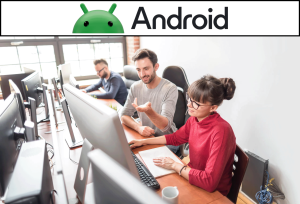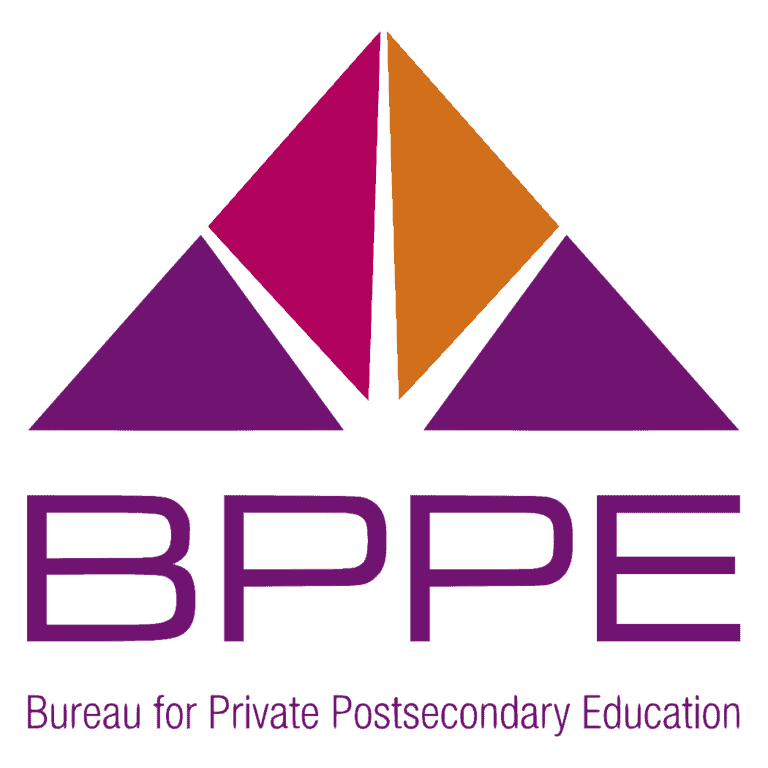Get the Skills to Become an Android App Developer

30-Week* Mobile Development Immersive 2 (MDI-2) Program
Android App Developers specialize in designing and creating applications for devices running on the Android operating system, which is used by a large number of mobile devices worldwide. They often work with clients, project managers, and design teams to understand the desired functionality and user interface of the app, ensuring it meets user needs and expectations.
The Mobile Development Immersive 2 (MDI-2) program is intended to be a dive into the dynamic world of mobile app development with a comprehensive focus on Google Android mobile software, applications, and programming languages.
The best way to see if San Diego Global Knowledge University is the right fit for you is to book an Admissions Appointment. You’ll meet with an Admissions Representative who will give detailed program and schedule information. Book an Admissions Appointment or Get more info.
Becoming a Skilled Android App Developer
The Mobile Development Immersive 2 program is designed for aspiring software engineers and developers who aim to specialize in creating innovative and user-friendly applications for the Android platform, which powers billions of devices worldwide.
Throughout this program, you will gain hands-on experience with the latest tools and technologies used in Android development. Starting with the fundamentals, you will learn about the Android operating system, its architecture, and the essential components of an Android app. As you progress, you will delve into more advanced topics such as user interface design, data storage, networking, and integrating third-party APIs.
Get Program Details Now!Apply Online
Is an Android Mobile Development Course Right For You? Find Out! Take the SDGKU “Career Training Readiness Quiz”
This fun, online quiz takes 3 minutes to complete and you'll get a personalized report. Identify your strengths and social style plus the training and positions you're best suited for. Get Your Career Training Readiness Score Now >>
Career Opportunities
As a graduate of the Mobile Development Immersive 2 program, career opportunities include:
- Android App Developer
- Mobile App Developer
- UI/UX Designer
- Software Engineer
- Quality Assurance Engineer
- Freelance App Developer
100% Online and Hybrid Options Available
Our program is designed to fit the needs of busy, adult learners, so you can choose between our 100% online or hybrid learning option. Many of our students are raising families and some continue to work while going to school. We will help you choose a schedule that works for you.
- Apply fundamental and intermediate programming principles to develop and optimize applications using Kotlin, Android Studio, and version control techniques.
- Implement user-friendly and efficient mobile application interfaces using Jetpack Compose.
- Apply programming languages and tools for Android to create mobile applications.
- Demonstrate the use of testing and debugging in mobile applications to ensure functionality and performance.
- Implement mobile applications on app stores while managing updates effectively.
Students enrolled in this non-degree program must achieve a minimum cumulative grade point average (CGPA) of 2.0 to graduate. Applicants for this non-degree program must submit the following documents:
1. The corresponding SDGKU online Application for Admission and supporting documents; and
2. Official transcripts of record from a high school recognized by the United States Department of Education or equivalent, including established foreign high schools, if the institution offering the program documents that its minimum required courses of study, units and content rigor are the same as those of a high school from an institution approved by the United States Department of Education.
30 weeks* or 24 semester credit hours.
Textbook Costs & ISBNs: View Document
Details
- This program is offered in both online and hybrid options.
- There is no difference in cost between the two options and there are no additional associated costs for taking the hybrid option.
- The curriculum for both options is the same in terms of academic requirements.
- The hybrid option is offered to students who would prefer to attend in-residence sessions periodically.
- Non-local students are responsible for their own travel expenses and lodging.
- There are NO textbook costs for this program (Estimated, purchased by students from publishers or re-sellers)
Modalities
Online students study and attend class remotely for 100% of their curriculum, while hybrid students are required to both study online and attend in-residence sessions offered at the SDGKU campus.
Scheduling
In-residence sessions are scheduled prior to start date of a program or course.
Enrollment
If you are interested in enrolling in a hybrid program, please reach out to our admissions representatives for details on scheduled in-residence sessions dates and times.

Lead Faculty: Sergio Inzunza, Ph.D.
Dr. Inzunza is a Full Stack Development Immersive professor, as well as Mobile Development Immersive 1 and 2 professor and lead faculty. He has over a decade of experience teaching software development and software engineering courses to bachelor’s-level students and professional development cohorts. He has extensive professional experience in the field of software engineering, having worked at various levels of software development for more than 15 years. Dr. Inzunza holds a Bachelor’s degree in Software Engineering, a Master’s degree in Computer Science, and a Ph.D. in Software Engineering from Universidad Autónoma de Baja California. His research areas include Software Engineering, Human-Computer Interaction, and Recommender Systems. He has published multiple research papers in international peer-reviewed journals. The aforementioned foreign academic degrees have been evaluated and recognized as equivalent to U.S. degrees.
In addition to his academic qualifications, Dr. Inzunza brings a robust professional background in the software development industry. He has held roles as a front-end, full stack, and mobile developer at Senior and Lead Engineer levels, contributing to high-impact projects at several multi-billion-dollar companies. His industry experience spans large-scale web and mobile applications, agile team leadership, and mentoring junior developers. This unique combination of academic rigor and practical expertise positions Dr. Inzunza to lead and inspire students in both the theoretical and applied aspects of software engineering.
Course Descriptions
In this course, students will explore the Android ecosystem and learn the fundamental concepts required to develop Android applications. They will start with an introduction to essential tools like Android Studio and the Kotlin programming language, followed by the fundamentals for designing user interfaces using the Jetpack Compose framework. This course is structured to provide hands-on experience in building simple Android applications, guiding students from setting up the development environment to managing layouts, views, and states.
(1 credit hour)
In this introductory course, students will develop a strong foundation in programming using the Kotlin programming language. Through hands-on exercises, students will learn essential programming principles such as variables, data types, control structures, and functions. The course will emphasize applying object-oriented programming (OOP) concepts and will conclude with a brief introduction to declarative programming. By the end of the course, students will be able to build simple programs and understand the fundamental differences between imperative and declarative programming approaches.
(1 credit hour)
In this course, students will deepen their understanding of programming concepts by working with more complex data structures such as arrays and dictionaries, while also advancing their skills in Object-Oriented Programming (OOP) and Declarative Programming. The course will emphasize applying intermediate-level programming techniques to build efficient and scalable programs. Additionally, students will gain hands-on experience with version control systems to manage their code effectively, laying the groundwork for professional software development practices. The skills acquired in this course will lay the groundwork for the subsequent exploration of mobile and platform-specific development.
(1 credit hour)
In this course, students will dive into the principles of User Experience (UX) and User Interface (UI) design for Android applications, following the guidelines set by Google’s Material Design framework. The course will emphasize creating aesthetically pleasing, functional, and intuitive interfaces tailored to Android devices. Students will learn to design wireframes, mockups, and interactive prototypes, developing skills necessary for communicating their designs effectively. By the end of the course, students will understand how to apply design principles to create user-friendly, accessible, and responsive Android applications.
(1 credit hour)
In this course, students will move beyond the theory of UX/UI design and focus on the practical implementation of user interfaces for Android applications. Using Google’s Material Design principles, students will develop fully functional Android app interfaces, implementing the wireframes and prototypes created in earlier courses. Emphasis will be placed on integrating user feedback, optimizing performance, and ensuring the usability of the final product. By the end of the course, students will be proficient in turning designs into fully functional, interactive Android applications.
(1 credit hour)
This course delves into the advanced techniques required to create sophisticated, cutting-edge user interfaces and experiences for Android applications. Building on the foundational skills learned in this course, students will explore dynamic UI components, adaptive layouts, complex animations, and the integration of artificial intelligence (AI) to enhance user experience. The course also focuses on advanced performance optimization strategies and the latest trends in Android UI/UX. By the end of this course, students will be equipped to tackle more complex design challenges and create immersive, responsive, and future-proof Android applications.
(1 credit hour)
In this course, students will learn the fundamental and advanced techniques required to test and debug Android applications. Students will explore different types of testing, including unit tests, UI tests, and performance tests, and will learn how to use Android’s testing frameworks and third-party tools to ensure the quality and reliability of their applications. In addition, the course will cover best practices for debugging, profiling, and identifying performance bottlenecks in Android apps. By the end of the course, students will have the skills needed to ensure their apps are bug-free, optimized, and user-friendly.
(1 credit hour)
This course introduces students to the foundational principles and practical implementation of data persistence in Android applications. Emphasis is placed on exploring various methods for storing, retrieving, and managing data within Android apps, with a focus on local storage solutions like SharedPreferences, SQLite databases, and the Room Persistence Library. Students will also delve into advanced topics, including integrating cloud storage solutions, synchronizing offline and online data, and handling data migrations. By the end of this course, students will have the skills to implement reliable and efficient data storage solutions, ensuring data integrity and accessibility across Android devices.
(1 credit hour)
This course equips students with the skills to integrate networking capabilities and web services into Android applications. Emphasis is placed on making HTTP requests, consuming RESTful APIs, and managing data exchange with web servers. Students will explore essential tools and libraries, such as Retrofit, OkHttp, and Volley, to handle network requests efficiently and parse data effectively. The course also covers best practices for asynchronous tasks, network security, and performance optimization, ensuring seamless communication between Android apps and web services. By the end of the course, students will be proficient in implementing secure, scalable, and efficient networking features within Android applications.
(1 credit hour)
This introductory course provides students with essential skills to leverage Android device sensors, enabling the creation of dynamic and responsive mobile experiences. Through hands-on learning, students will explore how to integrate and use various sensors, including accelerometers, gyroscopes, GPS, and proximity sensors, within Android applications. Emphasis is placed on gathering and processing real-time sensor data to develop location-based and sensor-driven features. By the end of the course, students will be able to build applications that interact seamlessly with the physical environment, enriching user experiences through sensor-based functionality.
(1 credit hour)
This intermediate course advances students’ understanding of device sensors in Android, focusing on complex, multi-sensor applications that respond dynamically to user interactions and environmental changes. Students will learn to integrate and manage data from accelerometers, gyroscopes, magnetometers, and environmental sensors, enabling immersive app experiences. The course explores advanced topics such as sensor fusion, real-time data visualization, and applying sensors in augmented reality (AR) applications. By the end of this course, students will be equipped with the skills to develop sophisticated, sensor-driven applications that enhance user engagement and functionality.
(1 credit hour)
This introductory course guides students in developing Android applications specifically for wearable devices, such as smartwatches and fitness trackers. Students will learn to navigate the unique challenges and opportunities of wearable development, including optimizing user interfaces for smaller screens, leveraging wearable-specific sensors, and managing data synchronization with smartphones. The course covers Android Wear OS integration, equipping students to build feature-rich applications that utilize capabilities like health tracking, notifications, and custom interactions. By the end of the course, students will have the skills to create efficient, engaging, and fully functional applications for wearables within the Android ecosystem.
(1 credit hour)
This intermediate course builds on foundational wearable app development skills, focusing on advanced techniques and complex use cases for Android Wear OS devices. Students will delve into multi-device synchronization, custom sensor integration, and creating sophisticated user interactions optimized for wearable environments. Key topics include advanced health tracking, third-party service integration, and performance optimization for resource-constrained devices. By the end of this course, students will have the skills to develop robust, feature-rich wearable applications that provide seamless and engaging experiences across multiple devices.
(1 credit hour)
In this course, students will learn how to develop applications specifically optimized for Android tablets, focusing on the unique design and functionality requirements of larger screen sizes. The course covers the use of responsive layouts, multi-pane UIs, and adaptive designs that provide seamless experiences across different tablet configurations. Students will also explore tablet-specific features such as drag-and-drop, multi-window mode, and advanced input methods like stylus support. By the end of the course, students will be able to create tablet applications that fully leverage the additional screen real estate and capabilities offered by Android tablets.
(1 credit hour)
In this course, students will learn how to implement localization in Android applications to cater to a global audience. The course covers the fundamental principles of adapting apps for different languages, regions, and cultural contexts. Students will explore best practices for translating text, formatting dates, numbers, and currencies and managing right-to-left (RTL) layouts. Additionally, the course will cover strategies for testing and optimizing localized apps to ensure a seamless experience across various markets. By the end of the course, students will be able to build Android applications that effectively support multiple languages and regional preferences, offering a personalized experience to users worldwide.
(1 credit hour)
In this course, students will learn the complete process of deploying Android applications and submitting them to the Google Play Store. The course covers essential topics such as preparing apps for release, signing APKs, generating app bundles, and optimizing apps for different devices and screen sizes. Students will also explore the Google Play Store submission process, including creating app listings, managing metadata, setting up in-app purchases, and adhering to Play Store policies and guidelines. By the end of the course, students will be proficient in deploying production-ready Android applications and successfully publishing them on the Google Play Store.
(1 credit hour)
This course focuses on the principles and techniques of automated testing in Android development. Students will learn how to write, run, and maintain automated tests to ensure app functionality, performance, and stability. The course covers unit testing, UI testing, and integration testing using popular frameworks like JUnit, Espresso, and Robolectric. Students will also explore test-driven development (TDD), continuous integration (CI) pipelines, and strategies for optimizing the test process. By the end of the course, students will be able to implement robust automated testing suites that improve the quality and reliability of Android applications.
(2 credit hours)
In this course, students will initiate their capstone project, synthesizing the knowledge and skills acquired throughout the Program. The focus will be on planning and designing a comprehensive Android application. Students will begin by conceptualizing an app idea, followed by conducting requirements analysis, designing user interfaces, and creating detailed project plans. By the end of this course, students will have a complete blueprint for their application, ready to proceed to development.
(2 credit hours)
In this course, students will begin developing their capstone project by implementing the core functionalities of their Android application. Emphasis will be placed on applying programming fundamentals, integrating user interface designs, and setting up data persistence mechanisms. By the end of this course, students will have a functional prototype that demonstrates the basic features of their application.
(2 credit hours)
In this final course, students will complete their capstone project by refining their application, implementing advanced features, and preparing it for deployment. The focus will be on optimizing performance, conducting thorough testing, and finalizing documentation. By the end of this course, students will have a polished, fully functional Android application ready for presentation and potential submission to the Google Play Store.
(2 credit hours)
FAQs
Is a Career as an Android App Developer Right for You? Get More Info…
If you’re interested in learning more about careers in Android App Development and exploring whether San Diego Global Knowledge University is right for you, fill out the form on this page to receive more information.
For immediate questions, call (619) 934-0797.
*Program length when completed in normal time.



